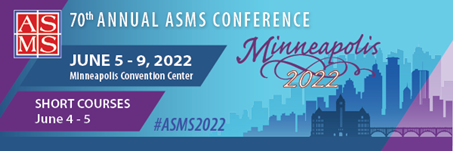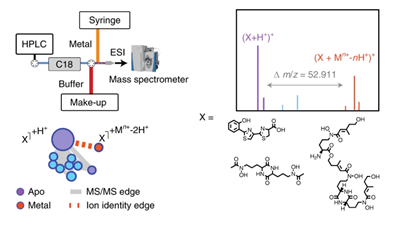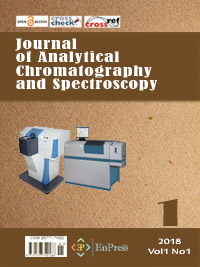2578-1766 (Online) Journal Abbreviation: J. Anal. Chromatogr. Spectrosc. | Journal of Analytical Chromatography and Spectroscopy is an international open access journal that publishes original research articles and review articles related to all areas of chromatography and spectroscopy. This journal will highlight the development and practices in sample preparation and specific derivatization for Mass Spectrometry and Chromatography, the connection of the analytical instrumentation in combinations for providing a high accuracy measurement as in Gas Chromatography-Mass spectrometry (GC-MS), Gas Chromatography-Mass Spectrometry (GC-MS) with Supersonic Molecular Beam (SMB), High Speed Gas Chromatography-Mass spectrometry (HSGC-MS), Supercritical Fluid Chromatography-Mass spectrometry (SFC-MS), Liquid Chromatography-Mass spectrometry (LC-MS) and Capillary Electrophoresis-Mass spectrometry (CE-MS) as well as using these combination of instrumentation in Mass Spectroscopy for molecular structure elucidation in organic and inorganic molecules,etc. |
Online Submissions
Registration and login are required to submit items online and to check the status of current submissions.
Already have a Username/Password for Journal of Analytical Chromatography and Spectroscopy?
GO TO LOGIN
Need a Username/Password?
GO TO REGISTRATION
Submission Preparation Checklist
As part of the submission process, authors are required to check off their submission's compliance with all of the following items, and submissions may be returned to authors that do not adhere to these guidelines.
- The submission has not been previously published, nor is it before another journal for consideration (or an explanation has been provided in Comments to the Editor).
- The submission file is in Microsoft Word format.
- Where available, URLs for the references have been provided.
- The text adheres to the stylistic and bibliographic requirements outlined in the Author Guidelines, which is found in About the Journal.
- If submitting to a peer-reviewed section of the journal, the instructions in Ensuring a Blind Review have been followed.
Privacy Statement
EnPress Publisher respects and strives to protect the privacy of its users and visitors. Hence, users and visitors are encouraged to read EnPress Publisher’s privacy policy regarding the usage and handling of user information.
(1) User information
Names and email addresses entered in all EnPress Publisher’s journal sites will be used exclusively for the stated purposes of the journals and will not be made available for any other purpose or to any other party. For submission and peer review, users should register an account for further procedures, including but not limited to name, email, address, interests, affiliation, and postcode, as editors need the information to complete in-house processes (e.g., processing a manuscript).
When users visit the publisher's website, information about the visit is saved in web logs (e.g., device, IP address, time of visit, etc.), which are only used to help improve the structure and content of the website.
(2) User rights
Users have the right to register or update their personal information and contact the publisher to cancel/delete their account if required.
(3) Third-party link
EnPress Publisher is not responsible for private information obtained by third-party websites when users log in via a pop-up screen from third-party software installed on their computer.
When users visit third-party platforms (e.g., LinkedIn, Twitter, COPE, etc.) through hyperlinks from EnPress Publisher’s journal websites, the privacy policy follows the policies of the third-party platforms.
(4) Queries or contact
For any queries about EnPress Publisher’s privacy policy, please contact the editorial office at editorial@enpress-publisher.com.
Article Processing Charges (APCs)
Journal of Analytical Chromatography and Spectroscopy is an Open Access Journal under EnPress Publisher. All articles published in Journal of Analytical Chromatography and Spectroscopy are accessible electronically from the journal website without commencing any kind of payment. In order to ensure contents are freely available and maintain publishing quality, Article Process Charges (APCs) are applicable to all authors who wish to submit their articles to the journal to cover the cost incurred in processing the manuscripts. Such cost will cover the peer-review, copyediting, typesetting, publishing, content depositing and archiving processes. Those charges are applicable only to authors who have their manuscript successfully accepted after peer-review.
| Journal Title | APCs |
|---|---|
| Journal of Analytical Chromatography and Spectroscopy | $800 |
We encourage authors to publish their papers with us and don’t wish the cost of article processing fees to be a barrier especially to authors from the low and lower middle income countries/regions. A range of discounts or waivers are offered to authors who are unable to pay our publication processing fees. Authors can write in to apply for a waiver and requests will be considered on a case-by-case basis.
APC Payment
Payments for APC of this journal can be made through our online PayPal payment gateway. Enter the article no. into the below textbox and select "Pay Now" to proceed with payment.
*Article No. is mandatory for payment and it can be found on the acceptance letter issued by the Editorial Office. Payment without indicating Article No. will result in processing problem and delay in article processing. Please note that payments will be processed in USD. You can make payment through Masters, Visa or UnionPay card.
Vol 5, No 1 (2022)
Table of Contents
Announcements
The “Conflict of Interest” policy is refined! |
|
| For the sake of academic fairness, all authors are required to declare all activities that have the potential to be deemed as a source of competing interest in relations to their submitted manuscript. Examples of such activities could include personal or work-related relationships, events, etc. Authors who have nothing to declare are encouraged to add "The authors declare that there is no conflict of interest" in this section. A declaration of interests for all authors should be received before an article can be reviewed and accepted for the publication. As the authors, editors or reviewers, they also are required to declare the conflict of interest in academy. | |
| Posted: 2022-10-24 | More... |
70th Annual ASMS Conference will be held in June |
|
 |
|
| Posted: 2022-04-09 | More... |
Native mass spectrometry-based metabolomics identifies metal-binding compounds |
|
 @Allegra T. Aron, et al. |
|
| Posted: 2021-12-28 | More... |
| More Announcements... |


 ISSN:
ISSN: Open Access
Open Access
